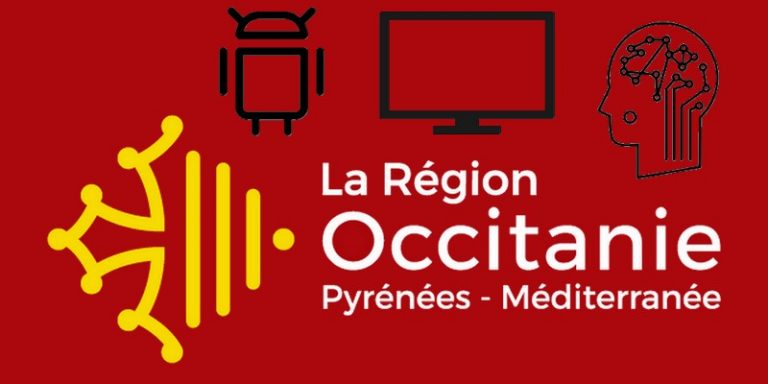
Voted by the last permanent commission of the Occitania region, a budget of 8 million euros will be allocated to support 159 thesis projects. This aid will be offered over the period 2021-2024. The Occitan doctoral students and their projects have been selected according to several criteria defined by the regional authority, such as a strong interest in sustainable development, regional industrial sectors or biological health sciences. ActuIA offers you the presentation of the eleven selected thesis projects related to artificial intelligence and digital transition.
The seven thesis projects in Artificial Intelligence
- CNRS Occitanie West Delegation, in partnership with the Laboratory of Analysis and Architecture of Systems (LAAS): MERLHE-BOT project “Reactive planning of coordinated movements for floating base robots in an industrial setting using artificial intelligence”. The aim is to use AI techniques so that a mobile robot facing unexpected situations can perform relevant movements. The industrial process targeted is deburring.
- École Nationale de l’Aviation Civile: Explainable-AI project “Use of new information presentation technologies to make artificial intelligence explainable and transparent for the acceptance and reliability of critical systems”. This thesis will propose solutions based on the interactive processing of large amounts of data to ensure the transparency and explanation of the results of data processing by AI algorithms.
- École nationale d’ingénieurs de Tarbes and the Production Engineering Laboratory (LGP): PROSPERE project “Contribution to the hybrid prognosis of failures and the management of prediction uncertainty for predictive maintenance”. The aim is to develop algorithms based on advanced artificial intelligence techniques for the early detection of anomalies, the anticipation of failures and the dynamic planning of maintenance interventions on industrial systems.
- École Nationale Supérieur des Mines d’Ales, in partnership with Movement to Health – EA 2991: M4sync project “Modelling and perception of multiscale synchronizations in the context of group sports and music”. In the context of sports and musical practice, the interactions between human movements and music reveal different types of synchronization. In this project, it is proposed to use emerging artificial intelligence tools to model these synchronizations.
- Office National d’Etude et de Recherche Aérospatiale in collaboration with the Department of Physics, Instrumentation, Environment and Space (DHPIEE): FIATIRAD project “Reliability of an on-board artificial intelligence dedicated to image processing in a radiative space environment”. The aim is to study the impact of space radiation on the reliability of the use of embedded AI for on-board image processing based on latest generation programmable components.
- CNRS Délégation Occitanie Ouest, in partnership with the Centre National de recherches météorologiques (CNRM): Aerosynergie project “Synergy between observations from passive, active and in situ sensors for aerosol characterization at the regional scale: assimilation and artificial intelligence methods”. Air quality is often impacted by extreme events such as desert dust transport, biomass fires or volcanic eruptions which are considered as important sources of aerosols hence the need for monitoring these particulate pollutants.
- Toulouse II – Jean Jaurès University with the Cognition, Languages, Language, Ergonomics (CLLE) laboratory: NEEDED project “analysis of the acceptability of a semi-autonomous vehicle adapting the driving parameters to the schedule of the driver”. The aim is to understand the determinants and indicators of the driver’s behaviour and then of the driver in these contexts, in order to define recommendations for the development of intelligent systems adapted to the needs, expectations and constraints of the driver, and to recommend a communicative interface between the system and the human accompanying the driver to curb his or her driving behaviour.
The four thesis projects focused on digital transformation
- University of Montpellier – Paul Valéry with CORHIS (Communication, Human Resources and Social Intervention) – EA 7400: GESCOVID project “Managing in times of crisis: what role for managers between anticipation, adaptation and digital innovation? A research with SMEs and SMIs in the Occitania region”. The aim is to offer companies support for digital and organisational transformation in order to better manage disruptions linked to health crises. Create the conditions for a safe and efficient recovery of activities and innovation, necessary for survival and development.
- Toulouse I – Capitole University in partnership with the Maurice Hauriou Institute (IMH): ENJEUX project “Legal and ethical issues of the use of digital methods and data science in the development of health products”. The emergence of data science and digital technology in biomedical research implies new concerns about the respect of human rights, fundamental freedoms and ethical principles of autonomy, non-maleficence, beneficence and justice ensuring the protection of the individual.
- University Toulouse I – Capitole in partnership with the Institute for Research in Informatics of Toulouse (IRIT): SO:LDI project “Open sciences: interoperable data lakes”. The aim is to capitalize on academic data in a referencing and exchange space offering an environment consistent with their FAIRisation (easy to find, accessible, interoperable and reusable data).
- University of Toulouse III – Paul Sabatier in partnership with the Institute for Research in Informatics of Toulouse (IRIT): BioMedExplore project “Information extraction and retrieval approach for the exploration and multifaceted analysis of corpus of scientific publications in Biomedicine”. To provide researchers in biomedicine and toxicology with data science tools to automate and accelerate the search for accurate scientific information essential to their research activities.
Translated from 11 projets de thèse liés à l’intelligence artificielle vont recevoir une aide de la région Occitanie









